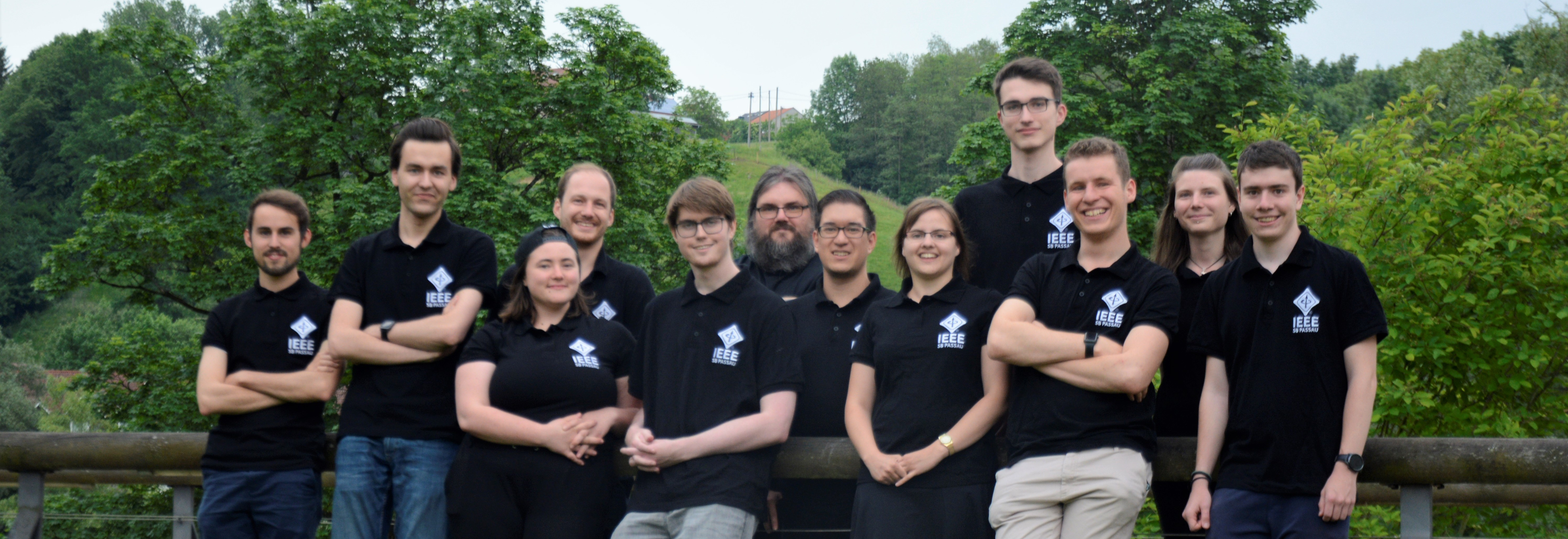entooInstallParty|\ As the installation of Ubuntu is easy nowadays
it’s not worthwhile anymore to organize a Linux Install Party so we invented something new! We show you how to install a Gentoo system from ground up und how to perform the first steps. Ssecondarily we explain to you how to compile your own kernel und how to use the basic tools. You can not only listen to exciting talks from professionals who use Gentoo in a productive environment but also install the system on your own brought Machine.
We would like to point out that the student representatives of the University of Passau recently launched a campaign to clean up the city of Passau after the flooding. See this link for further information.
The IEEE student branch Passau has been hosting Linux install parties since 2004.
EEE-Tux|\ If you would like to try out the Linux feeling which you
know from the CIP pool on your own computer, join us on one of our Linux install parties. Everybody is invited to these events, in particular our dear freshmen. Our competent and experienced Linux gurus help you to take the first steps on your way to the fascinating world of the open source operating system.
What do you get if you let some computer science students go to a
conference with a randomly generated paper?
They give a randomly generated talk! And you can do the same!
What happens there? Every participant gives a paper. He will get a projector, a notebook,
the audience and the slides from us. Disadvantage: The participant gets slides he has never seen before. In Short: impromptu presentations of each participant
The submission-deadline of the 4th IEEE Germany Student Conference in Hamburg will end at the 3rd of March 2012. Anyone who wants to submit a paper, please find further information at \ www.ieee-student-conference.de.
At the 28th of January 2013, Philipp Jovanovic, a researcher at the Chair of Mathematics with focus Symbolic Computation, gave a talk about „Attacks on Cryptographic Hardware”.
The slides can be downloaded here.
.. rubric:: Abstract: Algebraische Fehlerbasierte Angriffe :name: abstract-algebraische-fehlerbasierte-angriffe Die Untersuchung kryptographischer Verfahren auf ihre Stärke, sprich auf ihre Sicherheit, ist die wesentliche Aufgabe der Kryptoanalyse. Neben der klassischen Kryptoanalyse, die den Verschlüsselungsalgorithmus eines Verfahrens angreift, wurden in den letzten 15 Jahren verstärkt neue Formen der Kryptoanalyse entwickelt, nämlich die sogenannten Seitenkanalangriffe.
We want to thank our Sponsor CipSoft for paying for the gadgets and the pizza!
JRobots Coding Convention The current JRobots-Framework
A team, a bot and an arena. During four hours, the participants developed algorithms for a Java-Bot – Aiming, driving and shooting have to be perfect so a bot can stand its ground.
Your bot can drive around, can find the enemy with its scanner and is equipped with a fat cannon to kick you enemies ass.
In the winter-term 2012/13 we will host the talk-series “Tools für
dein Studium” where some tools will be presented, that may come in handy during your time at the university. Different experienced students will give talks about their favorite tools. They will present software and best practices they discovered during their studies and think that are useful. We will post the slides below after the talks.
LaTeX Lieferdienste Shell Versionsverwaltungssysteme
The IEEE Student Branch Passau hosts the so called Egg-Drop-Contest, where you have to protect chickens eggs when they are dropped from a height of \ [STRIKEOUT:10] [STRIKEOUT:15] 20 meters. The eggs will be put into a so called egg-dropper, any kind of construct, built by you, to protect the egg, and then, the whole thing will be dropped. The one who built the best egg-dropper will win. They will be ranked by the effectiveness of the protection and the creativity.
Git is one of the most commonly used distributed version control systems (VCS). It has been developed by Linus Torvalds and is known for being used as the VCS for the Linux kernel. In comparison to other VCS, such as Subversion, distributed VCS do not rely on a central repository; in fact, the repository is distributed among all the users. The talk by Michael Käufl offers an introduction to the use of git and explains typical workflows that are usually applied using git.











